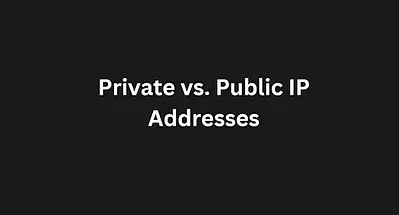When a device is connected to the internet or a local network, it is allocated an IP (Internet Protocol) address, which functions as a digital identifier to enable communication with other devices. These addresses are classified into two main types: private IP addresses and public IP addresses. Although both types serve the fundamental purpose of identifying devices, their functions and applications vary considerably. Below is an examination of the distinctions between them and their collaborative roles.
What Is a Private IP Address?
A private IP address is utilized within a local network environment, such as residential settings, workplaces, or educational institutions. It serves to identify devices, including laptops, smartphones, printers, and routers, that are part of the same network. These addresses are unique solely within their designated local network and remain hidden from the internet.
Private IP addresses are allocated from specific ranges designated by the Internet Assigned Numbers Authority (IANA). The commonly utilized ranges include 192.168.0.0 to 192.168.255.255, 10.0.0.0 to 10.255.255.255, and 172.16.0.0 to 172.31.255.255. Devices within the same local network communicate with one another using these addresses.
What Is a Public IP Address?
A public IP address is allocated by your Internet Service Provider (ISP) and is distinctive throughout the entire internet. It enables devices or networks to connect to the global internet and engage with external websites, servers, and services. Public IP addresses serve as identifiers for your network, utilized by websites and online services.
In contrast to private IP addresses, public IP addresses must maintain global uniqueness to prevent conflicts. These addresses can be either static (remaining constant) for services such as website hosting or dynamic (subject to change) for typical internet activities, based on the configuration set by the ISP.
Key Differences Between Private and Public IP Addresses
- Visibility and Accessibility: Private IP addresses function within isolated networks and remain hidden from the internet. This characteristic renders them inherently more secure and suitable for internal communications. Conversely, public IP addresses are accessible on the internet, which is crucial for connecting to external websites and services; however, they may be more susceptible to cyberattacks unless adequate security measures, such as firewalls, are implemented.
- Uniqueness: Private IP addresses are distinctive solely within their respective local networks, allowing various networks to utilize identical private address ranges without any issues. In contrast, public IP addresses must be universally unique across the internet, which guarantees precise routing and communication among devices globally.
- Cost: Private IP addresses can be utilized without charge and are administered internally by routers and network devices. In contrast, public IP addresses are allocated by Internet Service Providers (ISPs) and may involve extra fees, particularly when a static address is necessary for certain services.
- How Private and Public IPs Work Together
Network Address Translation (NAT) facilitates the interaction between private and public IP addresses. Routers implement NAT to allow devices with private IP addresses to utilize a single public IP address for internet access. This mechanism not only optimizes the limited availability of public IPv4 addresses but also enhances security by concealing internal IP addresses from external entities.
Which IP Address Should You Use?
- Private IPs: These are best for internal communication within a network, such as connecting multiple devices in your home or office securely. They help conserve public IPs and reduce exposure to external threats.
- Public IPs: These are essential for devices or services that need direct internet access, such as websites, online servers, or remote connections.
The Importance of Knowing the Difference
Comprehending the distinction between private and public IP addresses is essential for establishing secure and efficient networks. Private IP addresses safeguard internal communications and help conserve resources, whereas public IP addresses facilitate the necessary connectivity for worldwide access.
Collectively, they constitute the foundation of contemporary networking, allowing for uninterrupted communication while maintaining security and scalability. By utilizing the advantages of both types of IP addresses, one can enhance the network for both local operations and global connectivity.




